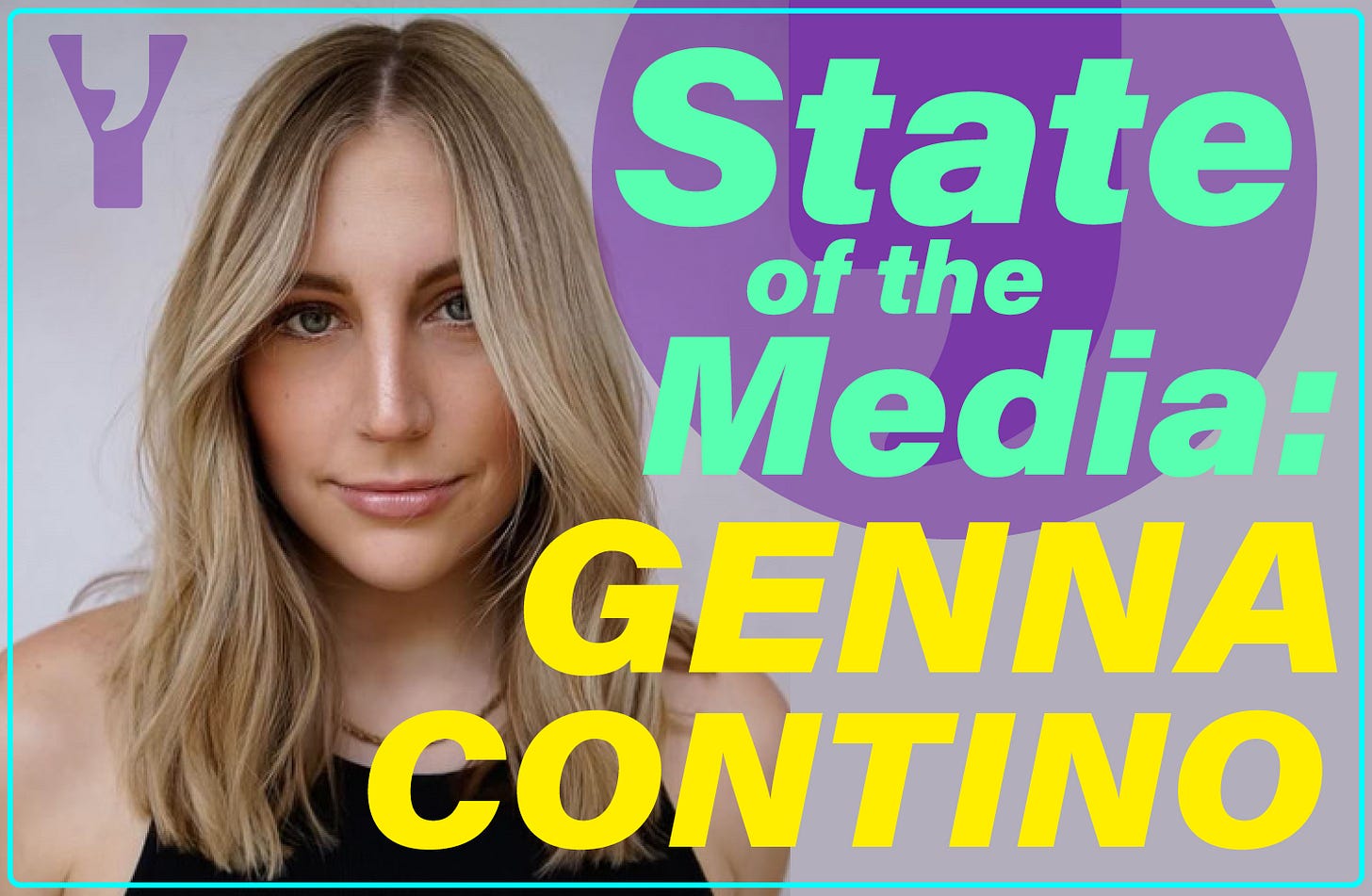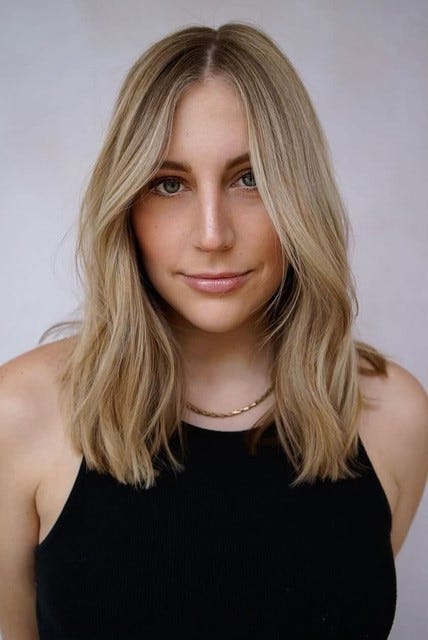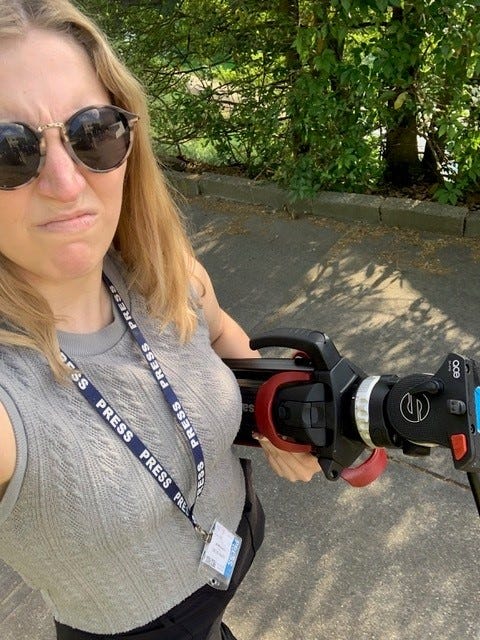State of the Media: Genna Contino
Genna Contino, formerly of the Charlotte Observer, talks with Y'all Weekly about the media landscape in Charlotte
Editor’s Note: Even before the most recent layoffs in North Carolina and Charlotte’s media landscape, we started planning our “State of the Media” series so you can know more about the people behind the stories, and what they think about the local media landscape in Charlotte. Genna Contino, who recently left the Charlotte Observer to pursue a graduate degree, spoke with Y’all Weekly about her experience in our media market.
Genna Contino
Key Stories:
There’s a pattern behind pedestrian, cyclist crash data. What’s Charlotte doing about it?
Q&A: Former CATS CEO John Lewis on why he really left and Blue Line derailment
CATS fired an employee for 2022 train derailment. He says there were warning signs
Bylines:
USA Today, The Charlotte Observer, The Greenville News, The Spartanburg Herald-Journal, The Daily Gamecock
Social Media:
Twitter: @gennacontino
Threads: @genconreporter
The Y’all Weekly Media Survey:
Questions and Answers below are unedited. Every journalist was provided the same 10 questions and could choose to exclude any, within reason.
Y’all Weekly: Broadly speaking, what is the state of local media in Charlotte?
Genna Contino: Charlotte’s local media landscape has changed drastically over the past couple of decades. Buyouts and layoffs at The Charlotte Observer gutted a newsroom that once boasted award winning work from dozens of reporters across multiple bureaus.
Charlotte’s not alone - as hedge funds bought up papers across America, all faced similar challenges. The response in Charlotte has been newspaper reporters turning to radio and other news sites emerging. A more recent impact of the changing landscape of local news happened this month when the Observer’s parent company McClatchy decided to let go Pulitzer winning cartoonist Kevin Siers.
Despite the challenge of corporate oversight, the talent of Charlotte journalists shines through. Covering local government for the Observer for the past year, I faced some tough competition that kept me on my toes. Other orgs like like Queen City Nerve, QC Metro and QNotes uplift voices of those pushed to the margins that mainstream news often misses.
YW: If you have to get up to speed on a topic quickly, where are you most likely to look?
GC: Say I’m writing about affordable housing. Here are different tactics I might use to get up to speed on an issue:
- Local leaders - those who run affordable housing nonprofits, sit on the safe neighborhoods council committee or work for the city’s housing department.
- The library - Charlotte librarians are great at helping me find resources on exactly what I’m looking for.
- National sources for broader concepts - Someone from a national housing coalition, a professor or another expert source.
- NC Legislature - What bills are going through the legislature that are relevant to what I’m writing about? Is there a statewide angle? Is there a state senator whose been rallying support for this?
- People actually living in affordable housing - It’s easy to write about what government says its residents want, but going directly to the source is always best. Social media is a great tool, but I’m not afraid to knock on a door if I have to.

YW: What do you think makes a story newsworthy?
GC: The wise reporter Joe Marusak once said a good story is one that makes you go “huh!” when you read the headline.
A newsworthy story has novelty, timeliness, a good hook and relevance - and it always answers the “why?"
YW: Is Charlotte and North Carolina's media landscape diverse enough to report on our community?
GC: This is a good question - and I really don’t know the answer to it. My gut is to say no. Most reporters I worked alongside in press gaggles were white and/or male.
I think Charlotte news outlets should be more intentional about hiring queer reporters. We can all be more intentional about what we cover and why we’re giving it attention.
YW: If someone just moved to Charlotte and North Carolina, and wants to be an informed voter and savvy media consumer, what should they read/listen to/watch?
GC:
POLITICS
- Subscribe to the Observer’s CLT Politics free newsletter for local politics
- Subscribe to News and Observer's Under the Dome newsletter for statewide politics
- Listen to Charlotte Talks on 90.7 WFAE
- Follow Joe Bruno, The Charlotte Ledger and Steve Harrison on Twitter for scoops
OTHER MEDIA
- Axios Charlotte’s Instagram and the Observer’s TikTok always post about fun things going around town
- Pick up a copy of Queen City Nerve on newsstands around town for free
YW: How does social media factor into the way you report?
GC: I “met” many of my sources on social media. Being active on Twitter kept my followers up to date on Charlotte news, but people stayed around for the silly tweets and personality peppered throughout (and I’m sure some unfollowed for the same reason). I think it’s important to show your sources that you’re human, and give some insight into why you reported on something the way you did and get feedback directly from the readers.
It’s also a great place to find sources. With one callout tweet looking for cyclists to interview, 20 emailed me by the next day. Facebook groups are great for finding people to talk about niche local topics. TikTok is great for keeping up with the latest trends that you could localize for a story.
YW: If you could wave a magic wand and fix one thing in the regional media landscape, what would it be?
GC: I would pay every reporter a minimum of $75,000. Reporting is not easy and so many are underpaid. I made $32,000 at my first journalism job in 2020. A lot of reporters love the work, but leave because they can’t afford cost of living on a journalist’s salary.
I was lucky to have the Observer Guild in my corner during my time at the Observer. It’s promising to me that other newsrooms are beginning to unionize across the country - shoutout WFAE! - and find strength in numbers.
-30-





